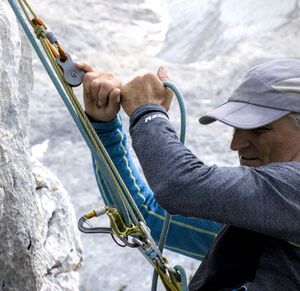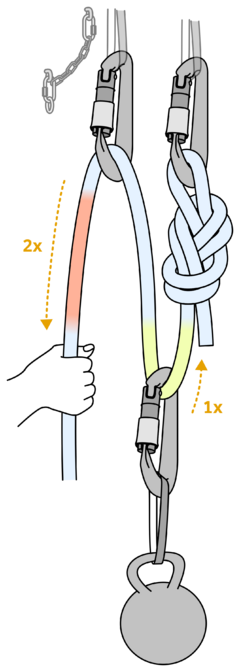Pulley (Pulley system): Difference between revisions
m Karl moved page Pulley to Pulley (Pulley system) |
mNo edit summary |
||
| Line 11: | Line 11: | ||
== Principle of operation == | == Principle of operation == | ||
[[File:Pulley_example.png|240px|thumb|left|2-to-1 pulley system.]] | |||
Pulley systems are simple machines used to lift heavy burdens. Image on the left describes 2-to-1 pulley. With this pulley, it takes roughly half of the force to lift the weight. But to lift the weight by 1 meter, you must take 2 meters of the slack as illustrated by arrows and colored parts of the rope. | |||
== 3-to-1 (2-to-1) Pulleys == | == 3-to-1 (2-to-1) Pulleys == | ||
Revision as of 07:12, 22 September 2025
| Pulley | |
|---|---|
 | |
| Other names | Pulley system |
| Use(s) | Rope support, rescue techniques, hauling |
In climbing and mountaineering pulleys are used mainly during rescue techniques. Sometimes they are employed during hauling.
Principle of operation

Pulley systems are simple machines used to lift heavy burdens. Image on the left describes 2-to-1 pulley. With this pulley, it takes roughly half of the force to lift the weight. But to lift the weight by 1 meter, you must take 2 meters of the slack as illustrated by arrows and colored parts of the rope.
3-to-1 (2-to-1) Pulleys
These pulleys cannot be used for lifting a full-body weight by a single person in the most situation. However, they work way faster than the higher-ratio pulleys. Their main use is in assisted lifting.
Rope-support
TODO
Creavase self-rescue
TODO
5-to-1 (4-to-1) Pulley
These pulleys distribute the force in a way that lifting a person is possible without assistance. However due to the ratio the speed of lifting is very low and there is substantial friction from the amount of bends in the pulley system.
Rescue
TODO